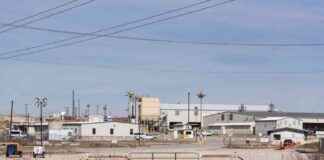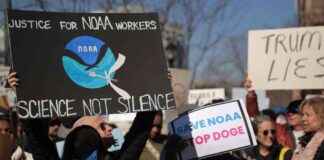President Donald Trump’s recent executive order, “Declaring a National Energy Emergency,” has sparked controversy among environmental groups due to its potential impacts on critical wetlands and waterways. The U.S. Army Corps of Engineers is fast-tracking over 600 permit applications for various projects, some of which have raised concerns about environmental conservation.
Environmental Groups Warn of Impacts on Wetlands
Environmental organizations have expressed alarm at the accelerated review process for projects that could harm wetlands and water sources. One such project involves a 37-mile crude oil pipeline in Louisiana, threatening 234 acres of wetlands near the Sabine National Wildlife Refuge. Additionally, a proposed crude oil pipeline under Lake Michigan, a crucial drinking water source for millions, has raised significant concerns.
Kristen Schlemmer, senior legal director of Bayou City Waterkeeper in Houston, part of the Waterkeeper Alliance, criticized the executive order, labeling it a “false emergency.” She emphasized the potential long-term consequences on climate change and urged for more proactive actions to mitigate environmental damage.
The Environmental Integrity Project highlighted non-energy-related projects, such as the Stibnite Gold Mine Project in Idaho, which could impact 145 acres of wetlands and 21 miles of streams. These examples underscore the varied environmental threats posed by the expedited permitting process.
Implications for Climate Change and Energy Policy
Experts and scientists have emphasized the importance of reducing human-caused emissions to limit global warming and avoid severe climate-related consequences. The fast-tracking of fossil fuel projects, including pipelines, power plants, and transmission lines, could exacerbate environmental challenges and hinder progress towards sustainable energy solutions.
David Bookbinder, director of law and policy at the Environmental Integrity Project, criticized the order’s implications for public engagement in the permitting process. He underscored the potential legal challenges and questioned the validity of an “energy emergency” in a country with abundant natural gas and oil resources.
The order’s directive to expedite permit reviews has raised concerns about reduced transparency, public input, and environmental impact assessments. Critics argue that streamlining the process could lead to inadequate evaluation of projects’ ecological consequences and limit opportunities for community feedback.
In conclusion, the executive order’s focus on energy production and infrastructure development has sparked a contentious debate over environmental conservation, climate change mitigation, and public involvement in decision-making processes. The implications of fast-tracking projects that threaten wetlands and waterways highlight the delicate balance between economic interests and environmental protection in national policy decisions.
This story, like all our news, is free to read because Inside Climate News is a nonprofit organization dedicated to providing accessible, high-quality reporting on climate and environmental issues. Your support helps us continue our vital work and reach more readers with impactful journalism. Thank you for being part of our community.














